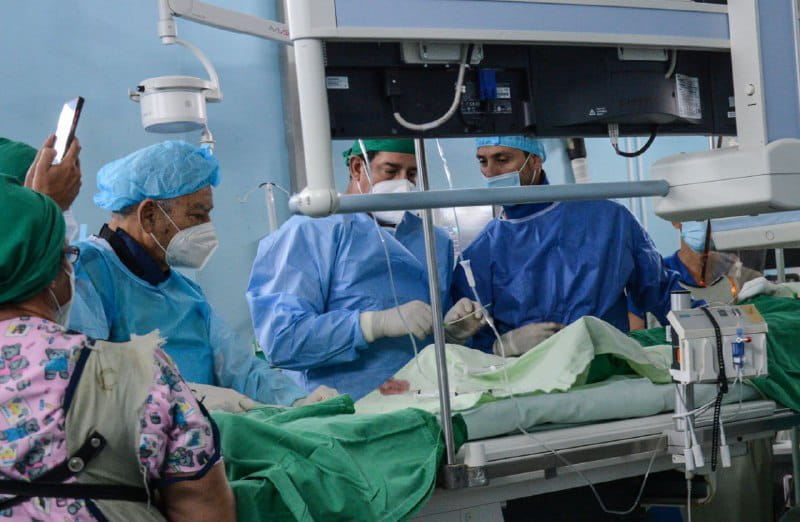
First percutaneous aortic valve implantation performed in Havana
Specialists from the Institute of Cardiology and Cardiovascular Surgery, in Havana, performed this Monday, for the first time in Cuba, a minimally invasive procedure to implant a percutaneous aortic valve in two patients with severe aortic stenosis.
The Cuban News Agency reports that Dr. Leonardo López Ferrero, interventional cardiologist and head of the Institute's Cardiology and Hemodynamics service, explained that for several years the center has developed this replacement surgically, while the current technique avoids cardiovascular surgery conventionally, reduces hospital stay and results in a better quality of life and recovery of patients.
Thanks to the donation of the devices by the European company Iberhospitex S.A. it was possible to carry out the procedure, since between the valve, which in this case comes from India, and the necessary equipment for its execution, the cost is around 60 thousand euros.
With the application of these prostheses, the specialists aspire to gradually start a program of transcatheter aortic valve implantation (TAVI), to which those people who meet the established electrocardiographic, echocardiographic, angiographic and tomographic criteria are eligible and that cardiac surgery is contraindicated, he said.
About how the technique is developed, López Ferrero, who received various trainings in hospitals in Barcelona, specified that the patient receives light sedation, approaches are made through the femoral and radial arteries, a catheter is taken to the aortic valve, which is narrowed and the new valve (of bovine pericardium) that is mounted on a stent replaces the diseased one.
The medical action took place this Monday, October 31, as part of a practical workshop, which integrates a training process that the institution's professionals have received for several years and that will later be transmitted to interventional cardiologists in the country, he said. Dr. Carmen Rosa Martínez Fernández, director of the Institute.
He explained that this is an important procedure for the nation due to the aging population, because degenerative aortic stenosis has a prevalence in the population over 65 years of age between four and seven percent (%), in approximately 30% of them surgery was not performed due to contraindications to surgical treatment and associated comorbidities.
While the mortality of patients with severe aortic stenosis is 50 to 60% between the first two or three years after diagnosis if no intervention is performed, so TAVI is a line of development of the entity and of Cuba , she narrowed.
In charge of the procedure was a multidisciplinary team made up of cardiologists from the Institute and the William Soler Cardiocentro, cardiovascular surgeons, sonographers, imaging specialists, specialists in anesthesiology and nursing staff, and was accompanied by the Spanish doctor Ignacio Amat Santos, chief of Hemodynamics and Interventional Cardiology at the Hospital Clínico Universitario de Valladolid.
The expert said that these prostheses began to be made in the 2000s due to the complications that some patients presented through the conventional route for surgery and something less invasive was thought of and that would allow their recovery more quickly.
In Spain, between four thousand and five thousand procedures are carried out annually in various hospitals. There is experience in the world, but only a short time ago an investigation showed that in patients with low risk for open surgery, this option was better, hence try to generalize it worldwide, he said.